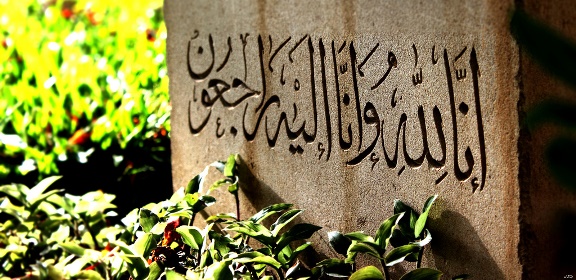26th October 2021
Question: A Muslim passed away and where they live the cemetery is divided into three parts. The front and rear are where Muslims are buried. Christians are buried in the middle part. There was no space in the Muslim parts, so she was buried in the middle next to a Christian. They did so in order not to delay the burial. She was the first Muslim buried there. There was another Muslim buried there after and it’s anticipated that portion of the Christian cemetery will be allocated for Muslims in future. But it is still next to Christians. Is that okay, or does she need to be moved to a Muslims only cemetery, particularly as she is next to a Christian at the moment? It may be possible they can move her if necessary.
الجواب حامداً و مصلياً
In the name of Allāh, the Most Gracious, the Most Merciful
Answer
As a general note to begin with, having a specific burial cemetery for Muslims has been a continuous practice since the time of the Messenger of Allāh sallallahu alayhi wasallam. This is because our burial rituals are distinct from other faiths. Another reason for burying Muslims and non-Muslims in separate cemeteries is because according our tradition, Allāh’s wrath descends upon a disbeliever for not bringing faith upon Allāh I and His beloved Messenger sallallahu alayhi wasallam unlike for a true believer.[1] For this reason it is not appropriate nor permitted for a Muslim to buried in a non-Muslim cemetery.[2]
Concerning your case however, if this sister had to be buried in the Christian area due to lack of space in the Muslim area and next to her, another Muslim is buried then that would be permissible as a necessity. It will not be necessary to exhume her body thereafter to relocate her elsewhere. Exhuming the body is necessary in specific circumstances only like being buried in a land owned by someone else for instance.[3]
[Allãh Knows Best]
Written and researched by (Mufti) Abdul Waheed
Answer Attested by Shaykh Mufti Saiful Islam
JKN Fatawa Department
[1] Kasān, Badā’i Sanāi, Kitāb Janāiz, vol 1 p. 319
وَيُكْرَهُ أَنْ يَدْخُلَ الْكَافِرُ قَبْرَ أَحَدٍ مِنْ قَرَابَتِهِ مِنْ الْمُؤْمِنِينَ؛ لِأَنَّ الْمَوْضِعَ الَّذِي فِيهِ الْكَافِرُ تَنْزِلُ فِيهِ السَّخْطَةُ وَاللَّعْنَةُ فَيُنَزَّهُ قَبْرُ الْمُسْلِمِ عَنْ ذَلِكَ، وَإِنَّمَا يَدْخُلُ قَبْرَهُ الْمُسْلِمُونَ لِيَضَعُوهُ عَلَى سُنَّةِ الْمُسْلِمِينَ،
[2] Zuhayli, Fiqhul Islami wa adillatihu, vol 2 p. 480
الفرض الرابع ـ دفن الميت:
مكان الدفن والدفن في البحر
ولا يدفن كافر في مقبرة المسلمين، ولا مسلم في مقبرة الكفار
[3] Durrul Mukhtār wa hashiyah Ibn Ābideen Shāmi, Kitāb Janāiz, vol 2 p. 238
(وَلَا يُخْرَجُ مِنْهُ) بَعْدَ إهَالَةِ التُّرَابِ (إلَّا) لِحَقِّ آدَمِيٍّ كَ (أَنْ تَكُونَ الْأَرْضُ مَغْصُوبَةً أَوْ أُخِذَتْ بِشُفْعَةٍ) وَيُخَيَّرُ الْمَالِكُ بَيْنَ إخْرَاجِهِ وَمُسَاوَاتِهِ بِالْأَرْضِ كَمَا جَازَ زَرْعُهُ وَالْبِنَاءُ عَلَيْهِ إذَا بَلِيَ وَصَارَ تُرَابًا زَيْلَعِيٌّ.
(قَوْلُهُ إلَّا لِحَقِّ آدَمِيٍّ) احْتِرَازٌ عَنْ حَقِّ اللَّهِ تَعَالَى كَمَا إذَا دُفِنَ بِلَا غُسْلٍ أَوْ صَلَاةٍ أَوْ وُضِعَ عَلَى غَيْرِ يَمِينِهِ أَوْ إلَى غَيْرِ الْقِبْلَةِ فَإِنَّهُ لَا يُنْبَشُ عَلَيْهِ بَعْدَ إهَالَةِ التُّرَابِ كَمَا مَرَّ (قَوْلُهُ كَأَنْ تَكُونَ الْأَرْضُ مَغْصُوبَةً) وَكَمَا إذَا سَقَطَ فِي الْقَبْرِ مَتَاعٌ أَوْ كُفِّنَ بِثَوْبٍ مَغْصُوبٍ أَوْ دُفِنَ مَعَهُ مَالٌ قَالُوا: وَلَوْ كَانَ الْمَالُ دِرْهَمًا بَحْرٌ

